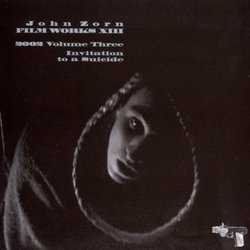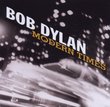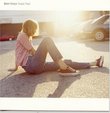| All Artists: John Zorn Title: Filmworks XIII: Invitation to a Suicide Members Wishing: 4 Total Copies: 0 Label: Tzadik Release Date: 9/24/2002 Album Type: Soundtrack Genres: Jazz, Special Interest, Pop, Soundtracks Styles: Avant Garde & Free Jazz, Experimental Music Number of Discs: 1 SwapaCD Credits: 1 UPC: 702397734123 |
Search - John Zorn :: Filmworks XIII: Invitation to a Suicide
 | John Zorn Filmworks XIII: Invitation to a Suicide Genres: Jazz, Special Interest, Pop, Soundtracks
|
Larger Image |
CD DetailsSimilarly Requested CDs
|
CD ReviewsFive Plus - A Welcome Addition to Zorn's Corpus 10/24/2002 (5 out of 5 stars) "This film score is for just one film (as opposed to so many of these film work discs which feature cuts from a few films). In addition, all cuts feature just one band with no cutting back and forth between innumerable styles of music, and groups. What transpires is not just well-crafted music played exceedingly well - that is typical of Zorn outings (and expected!) - but a band gelling to create some very inspired music. Regulars Ribot, Friedlander, Cohen, and Wolleson join forces with Rob Burger on accordion to create some well textured tunes that tackle a variety of settings, but carries an overall theme and coherence. It's great stuff. Will definitely draw the listener in - even newbies to Zorn." A note on the track order PH-50-NC | Southeast USA | 07/22/2003 (4 out of 5 stars) "Zorn writes in the liner notes that this session was a 'pivotal moment.' He compares it to the other highpoints of his career.At first, I wasn't feeling it. Track one treats one of the main themes in a repetitive manner, and to me it was more Penguin Cafe Orchestra-repetitive than Steve Reich-goosebumps-inducing repetitive. In fact, track one may be my least favorite track on this very good album (though I like it more now that I've placed it at the end of the program).So I let it sit for awhile, then came back to it to see if I would hear it any different. I rearranged the track order (the better part of an hour, trial-and-error), and now I love it. I'll only add that Ribot is understated and most excellent as always, and my track order probably reflects my Ribot jones to a certain extent. I agree with the comments of the earlier reviewer, that the unity of players, instrumentation, and to an extent, style (there is enough variation to keep things interesting, but this is definitely not jump-cutting music a la Naked City) make this a pretty outstanding disc. The track order I settled upon is this: 3, 8, 6, 10, 5, 13, 2, 11, 17, 16, 15, 14, 12, 9, 4, 18, 7, 1. I also put a little more silence between the tracks to give them some breathing room.Yes, I am a music nerd." One of Zorn's best albums SPM | Eugene, Oregon | 08/23/2003 (5 out of 5 stars) "John Zorn wrote about ten songs for this movie, then he wrote a few more arrangements for each one. It takes a while before you notice the repetition. "Getting Suicidal," for example, is a guitar version of "Suicide Blues.""Suicide Waltz," "The Suicide Kid," "Lonely Are the Dumb," and "Bugsy's Jazztet" are all the same song in different arrangements - accordion-led jazz ensemble, cello-led jazz ensemble, "country" guitar, and rock/jazz fusion (respectively).This approach unifies the feel of the album without giving you the impression that you're hearing the same thing over and over. It helps that the musicians play so well --- rather than approach each new arrangement as an alternate take, they play like it's a whole new song. It's an amazing thing to hear.Even if you're not into Zorn, you'll love this."
|

 Track Listings (18) - Disc #1
Track Listings (18) - Disc #1
